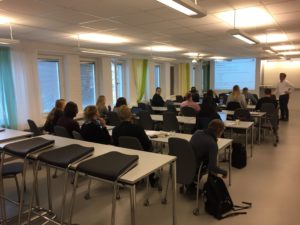
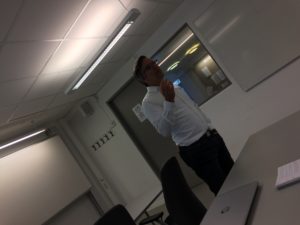 Professor Daniel Geiger was kind enough to give a workshop too about his view of ethnography and its practice. It was three hours really well spent on the challenges that faces anyone that is interested in such methods, summarized into collecting, analysing and writing up such data! Several good examples of his and others were provided as food for thought to the participants.
Professor Daniel Geiger was kind enough to give a workshop too about his view of ethnography and its practice. It was three hours really well spent on the challenges that faces anyone that is interested in such methods, summarized into collecting, analysing and writing up such data! Several good examples of his and others were provided as food for thought to the participants.
First grant received, Robert receives money from the Kempe foundation
A lot of exciting news now! Robert received his first grant from the Kempe foundation for going to a doctoral course in Lund on critical management. Congrats!
Rantatalo, Lindberg, Kihlberg & Hällgren – Negotiations and Research Bargains: Bending Professional Norms in the Effort to Gain Field Access
This morning Ola received the news that our paper is available to everyone. The paper is published on an “open access” basis and as a consequence open to anyone! It details the methodological struggles that we have had with one of our projects, and the kind of challenges and opportunities that arose from those – and how we navigated the treacherous waters.
You find the paper here
Abstract
The present study provides an autoethnographic account of the efforts to gain field access to a police organization, spanning more than 2 years. The aim is to describe a case of gaining access in relation to the professional norms of science put forward by Robert K. Merton. Aided by an organized record of notes, e-mails, and other written communications regarding access (144 memos of various types), the study describes and discusses the negotiations with Mertonian norms that followed from the dissonance between ideals of research and practical reality. Opening up for further scholarly discussion, this article concludes that Merton’s norms are incongruent with both prevailing guidelines of research ethics and with the practical, short-term problems of access negotiations and research bargains.
Seminar with Professor Daniel Geiger
 Wonderful seminar today with professor Daniel Geiger on how “coordination saves lives”, specifically he have been studying the coordination in Ugandan refugee settlements. I do not want to give away his ideas publicly like this but a lot of interesting stuff coming out of it!
Wonderful seminar today with professor Daniel Geiger on how “coordination saves lives”, specifically he have been studying the coordination in Ugandan refugee settlements. I do not want to give away his ideas publicly like this but a lot of interesting stuff coming out of it!
ODD seminar – The “WHY” of TripleEd
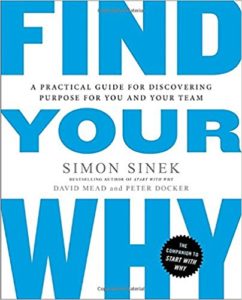 Today we had a ODD seminar again. This time it was Markus turn to host it. We made use of something as unscientific as Simon Sinek´s “Find your why” to explore the “hidden” reasons to what we are doing. It took a good part of 2,5 hours and we could probably have continued (and will continue), but now we have a draft of a statement. We will not reveal it for the public just yet but it do catch the essence of why we are doing what we are doing.
Today we had a ODD seminar again. This time it was Markus turn to host it. We made use of something as unscientific as Simon Sinek´s “Find your why” to explore the “hidden” reasons to what we are doing. It took a good part of 2,5 hours and we could probably have continued (and will continue), but now we have a draft of a statement. We will not reveal it for the public just yet but it do catch the essence of why we are doing what we are doing.
Article accepted – Alison Stowell & Samantha Warren on “The Institutionalization of Suffering: Embodied inhabitation and the maintenance of health and safety in e-waste recycling” in Organization studies
Some two years ago, TripleEd arranged a workshop on experimental methods and approaches in extreme contexts. As part of the workshop Alison and Sam (a guest researcher at USBE, and involved with TripleEd) participated and was kind enough to later give a presentation at USBE on a paper they were working on. Now that very paper has been published, congratulations Alison and Sam!!! The paper is entitled “The Institutionalization of Suffering: Embodied inhabitation and the maintenance of health and safety in e-waste recycling ” and is accepted for publication in Organization Studies!
Article accepted – Liminal practice and reflection in professional education: police education and medical education accepted for Studies in Continuing Education
Today Oscar and Ola had the great news that their article “Liminal practice and reflection in professional education: police education and medical education” was accepted for publication in Studies in Continuing Education! You find the article here
ODD seminar on Orchestrating reforms
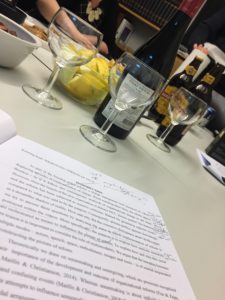 This week it was Robert´s turn to arrange the ODD seminar. We discussed the paper “Orchestrating reforms” that Robert have written with Oscar, Ola and Markus. The paper deals with how multimodal resources are used in videos for sensegiving of the reform. As always a very nice way of ending the week!
This week it was Robert´s turn to arrange the ODD seminar. We discussed the paper “Orchestrating reforms” that Robert have written with Oscar, Ola and Markus. The paper deals with how multimodal resources are used in videos for sensegiving of the reform. As always a very nice way of ending the week!
Seminar & Workshop with David Buchanan
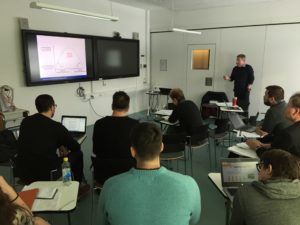 The other week we had the absolute pleasure of welcoming professor David Buchanan to Umeå as part of the research exchange program financed by Riksbankens jubileumsfond.
The other week we had the absolute pleasure of welcoming professor David Buchanan to Umeå as part of the research exchange program financed by Riksbankens jubileumsfond.
During the visit David met with several people in the research group to discuss how to push articles and ideas forward. David also gave one seminar and one workshop related to methods used to overcome the challenge of studying extreme contexts. The workshop was about the use of fiction in studying management and organisation, most specifically movies, such as zombie movies. The seminar was related to the book he is about to publish with the late Alan Bryman. (link here). The book, “Unconventional Methodology in Organization and Management Research” deals with numerous less conventional methods (such as film) is used to access hard to access settings.
WORKSHOP with David Buchanan on “The Use of Fiction in Organization & Management Research”
 It is the absolute pleasure of TripleEd to invite you (again!) to a WORKSHOP with Professor Emeritus David Buchanan at Cranfield University, UK. David has a lot of experience in using and writing about unconventional methodology in management and organization studies. Take the chance of learning about doing things a little bit differently!
It is the absolute pleasure of TripleEd to invite you (again!) to a WORKSHOP with Professor Emeritus David Buchanan at Cranfield University, UK. David has a lot of experience in using and writing about unconventional methodology in management and organization studies. Take the chance of learning about doing things a little bit differently!
WHERE: S303
WHEN: Wednesday 7/3
TIME: 09.15-12
Bio and poster about the workshop attached. Please distribute the information to anyone that you think might be interested!
Everyone is most welcome!
David Buchanan WORKSHOP on the use of fiction in MOS – POSTER